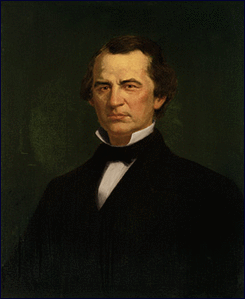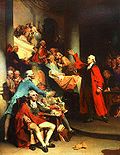 I’m extremely happy that I’ve finally dismissed Wagner who was no more than a third rate hack with no talent except for shameless self promotion (hey, it takes one to know one), but he codified The 3 Rules of Opera in a way that led Chuck Jones to create the best cartoon of all time (I’d embed it, but it never stays up for long).
I’m extremely happy that I’ve finally dismissed Wagner who was no more than a third rate hack with no talent except for shameless self promotion (hey, it takes one to know one), but he codified The 3 Rules of Opera in a way that led Chuck Jones to create the best cartoon of all time (I’d embed it, but it never stays up for long).
Sung by Elmer J. Fudd, Millionaire, who owns a mansion and a yacht, and Bugs Bunny (from Flatbush Brooklyn by most accounts though some say the Bronx or even shudder Poughkeepsie New Joisey), there are Three Acts and as I recall it goes a little something like this (Elmer in Italics, Bugs in Normal; Singing Centered, Spoken Left Justified)-
Be vewy quiet I’m hunting wabbits Wabbit tracks!!!Kill the wabbit, kill the wabbit, kill the wabbit Kill the rabbit?Yo ho to oh! Yo ho to oh! Yo ho… O mighty warrior of great fighting stock Might I inquire to ask, eh, what’s up doc?? I’m going to kill the wabbit!! Oh mighty hunter t’will be quite a task How will you do it, might I inquire to ask?? I will do it with my spear and magic helmet! Your spear and magic helmet? Spear & magic helmet! Magic helmet? Magic helmet! (Dismissively) Magic helmetYes, magic helmet, and I’ll give you a sample
Stage direction: General DevastationBye
That was the wabbit!!!Stage direction: Bugs Cross Dressed
Oh Brunhilda, you’re so wuvely Yes I know it I can’t help it Oh Brunhilda be my wuve Return my wuve a longing burns deep inside me Return my love I want you always beside me Wuve like ours must be Made for you and for me (Harmony) Return won’t you return my love for my love is yours Stage direction: You tip your hat to this Teuton son and all them ears come out from underneath
I’ll kill the wabbit! Arise storms North winds blow, south winds blow Typhoons, hurricanes, earthquakes, SMOG! Flash lightning strike the wabbit What have I done?? I’ve killed the wabbit… Poor little bunny, poor little wabbit…
Well what did you expect in an opera, a happy ending???
That HTML is more complicated than it looks.
Now you might suspect this is the introduction to some Wagnerian Opus and I’ve already said it will be a cold day in Muspelheim. He represents everything bad and overblown about Romantic Art Music. No, it’s simply to remind you of The 3 Rules of Opera which are-
- It must be long, boring, and in an incomprehesible foreign language (even if that language is English).
- The characters, especially the main ones, must be thoroughly unsympathetic and their activities horrid and callous.
- Everyone must die, hopefully in an ironic and gruesome way.
Ballet is the same, but with more men in tights and without the superfluous singing.
Today’s subject is Lucia di Lammermoor, also Romantic but from a time when Wagner was a struggling nobody and Gaetano Donizetti was the last remaining “genius” of the Italian School after the death of Vincenzo Bellini and the retirement of Gioachino Rossini.
While the plot bears some similarity to a mashup of Romeo and Juliet and MacBeth it is in fact lifted from Sir Walter Scott’s The Bride of Lammermoor.
Lucy Ashton’s (Lucia) family is feuding with the Ravenswoods. She’s in love with Edgar Ravenswood (Edgardo) who is observed sneaking into the Castle by Norman (Normanno) who duly reports this to her brother Henry (Enrico) who is consumed with a deep and abiding hated of all things Ravenswood.
Lucy waits for Edgar by a fountain with her maid Lisa (Alisa) and tells her (or rather sings her because this is an Opera after all) that she has seen the ghost of a girl killed on the very same spot who was killed by a (now also dead) Ravenswood out of jealousy. Lisa replies that this is an omen and Lucy really ought to ditch Edgar. Edgar arrives and tells Lucy he must leave for France and that he hopes to convince Henry of his sincerity and marry before he goes. Lucy says- ‘Are you nuts?’ and instead they exchange rings and pledge eternal love.
While Edgar is away, Henry arranges to marry Lucy off to Arthur (Arturo). Worried she is still in love with Edgar (which is true), he shows her a forgery that ‘proves’ Edgar has forgotten her and is shacking up with someone else. He leaves it to her old pastor Raymond (Raimondo) to make the argument that she should go through with this for the good of the family.
Arthur arrives to pick up his bride Lucy but she’s behaving, umm…, erraticly. Edgar assures Arthur she’s just upset over the death of her Mom. Arthur signs on the dotted line and Lucy follows reluctantly. At that point Edgar shows up and Raymond steps in and shows Lucy’s signature on the contract. He yells at her (well, sings, you know) and demands she return his ring and takes hers and tramples it on the floor. At this point the bouncers show him the street.
Henry is still pissed and challenges Edgar to a duel. He tells Edgar she is already doing it with Arthur and likes it very much thank you. Edgar replies- ‘I’m going to kick your ass’.
Well, Lucy is not enjoying it and has killed Arthur. Raymond comes in and tells everyone what she has done and proclaims her ‘Mad’. Then Lucy shows up and cops an insanity defense, singing passionately of an imagined happy life with Edgar. Henry enters and is at first enraged and then softens as he becomes convinced his sister truly is insane. She collapses and Raymond blames Norman for the whole tragedy.
And now, dear reader, I’ll ask you to pause.
Is Lucy dead?
Mental Illness is a bad thing and very real, leading you to suicidal and homocidal impulses and self destructive behaviors, but it doesn’t generally strike you down like a brain aneurysm unless that’s what caused it. There’s no reason to think Lucy’s actions anything but rational (if a bit psychotic) in today’s culture. Sure juries find people like that guilty and pack them off to the pen or execute them all the time, but they’re not stricken down by the lightning bolts of Zeus or the Hand of God. Keep that in mind as I tell you what happens next.
Edgar has resolved to die in order to kill Henry. He hears of Lucy’s sudden breakdown and then instead of Henry, Raymond appears and tells him Lucy is dead. Edgar stabs himself fatally so he can be reunited with Lucy in Heaven.
Hmm…, ironic and gruesome enough for you?
Embedding disabled by request. Told you things don’t stay up.
My personal theory is that Henry, still hating Edgar and the Ravenswoods as much as ever and unwilling to risk a duel with a kamikaze, sends Raymond out just to provoke the reaction he got. Does he marry Lucy off to someone else? Does he send her to a nunnery? Does she commit suicide herself? Henry is evil through and through and is not above doing anything to get what he wants.
At this point I don’t care either. It’s been two and a half hours and my butt is sore and I gotta pee.
Sure Il dolce suono is considered one of the greatest arias ever and is a staple of every famous soprano you’ve ever heard of except for Tony, but it’s Scene 2 of the Third Act!
I suppose you can linger over dessert and get that second cup of coffee without guilt. You won’t miss anything important. Oh, and don’t bother sticking around for the last credit to roll in Age of Ultron either. Once Thanos says he’ll do it himself it’s Third Grips and Craft Services until they close the curtains.
Obligatories, News and Blogs below.


 Welcome to the Stars Hollow Gazette‘s
Welcome to the Stars Hollow Gazette‘s 


Recent Comments